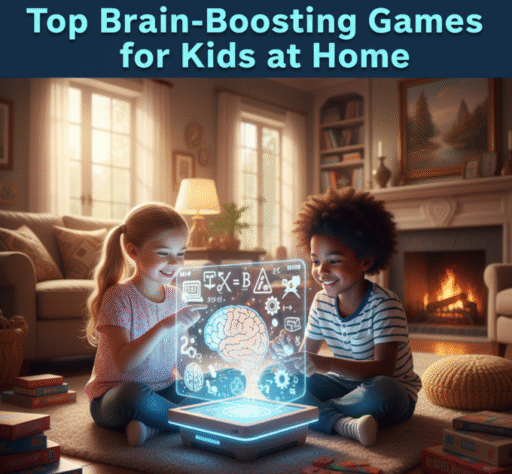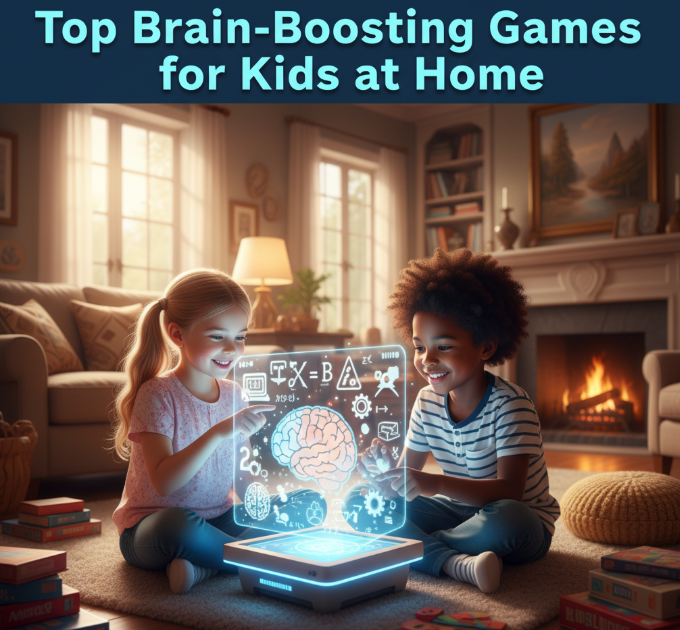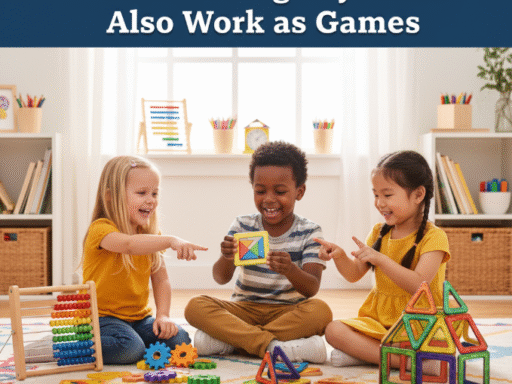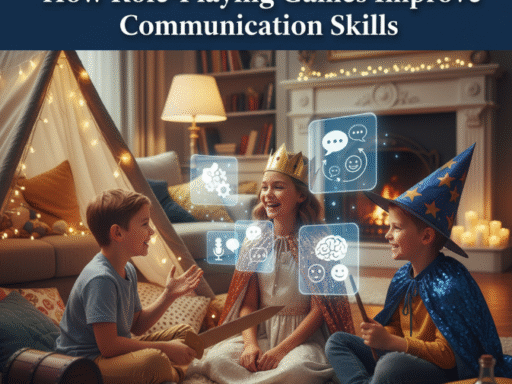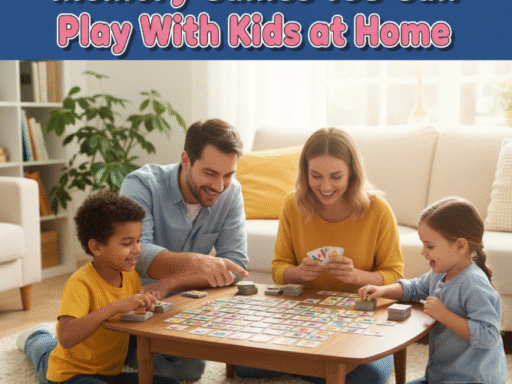Introduction: Making Playtime Smarter
Children are naturally curious and love to play. But what if playtime could also boost memory, sharpen focus, and strengthen problem-solving skills? Brain-boosting games do exactly that. These activities are fun, engaging, and packed with hidden learning opportunities. At home, parents can use them not only to keep kids entertained but also to help them grow mentally, emotionally, and socially.
This article explores top brain-boosting games for kids at home, covering indoor classics, creative DIY games, strategy-based activities, and modern twists on traditional puzzles. Whether you’re looking for solo play or group family fun, these games can turn ordinary moments into powerful learning experiences.
Why Brain-Boosting Games Matter for Kids
Before jumping into the list, let’s quickly see why these games are so important.
-
Improves Memory: Games that involve recall or matching sharpen short-term and long-term memory.
-
Encourages Critical Thinking: Strategy and puzzle games push kids to think outside the box.
-
Builds Social Skills: Multiplayer games teach teamwork, patience, and communication.
-
Boosts Creativity: Craft-based or role-playing games unlock imagination.
-
Supports Academic Learning: Many brain games indirectly strengthen math, language, and science skills.
Classic Indoor Brain Games
1. Memory Card Match
A timeless game that strengthens memory and concentration.
How to Play:
-
Place cards face down on a table.
-
Kids take turns flipping two cards at a time to find a match.
-
The player with the most matches wins.
Skills Developed:
-
Short-term memory
-
Visual recognition
-
Patience
💡 Tip: Use homemade cards with pictures of animals, shapes, or even family members for extra fun.
2. Simon Says (with a Twist)
This classic listening game can be upgraded to boost both body and brain.
How to Play:
-
One player gives commands starting with “Simon says.”
-
Add a challenge: include memory sequences (e.g., “Simon says jump, spin, clap”).
Skills Developed:
-
Active listening
-
Memory recall
-
Coordination
3. Jigsaw Puzzles
Jigsaw puzzles are more than just a way to pass time; they build problem-solving stamina.
Why It Works:
-
Helps kids recognize shapes and patterns.
-
Improves patience and focus.
-
Builds spatial reasoning.
📊 Puzzle Difficulty by Age
| Age Group | Recommended Puzzle Pieces | Benefits |
|---|---|---|
| 3–5 years | 20–40 pieces | Improves shape recognition |
| 6–8 years | 50–150 pieces | Builds focus and memory |
| 9–12 years | 200–500 pieces | Enhances problem-solving |
Strategy and Thinking Games
4. Chess for Kids
Chess is known as the ultimate brain game—and kids can start learning as early as six.
Benefits:
-
Develops patience and focus.
-
Improves logical thinking.
-
Encourages planning ahead.
📝 Parent Hack: Use kid-friendly chess apps or colorful starter chess sets to keep learning fun.
5. Sudoku for Beginners
Sudoku doesn’t have to be overwhelming; child-friendly versions with pictures or smaller grids are perfect.
How It Helps:
-
Strengthens logical reasoning.
-
Teaches number placement and sequencing.
-
Improves focus.
6. DIY Treasure Hunt with Clues
Turn your living room or backyard into a treasure island filled with riddles and puzzles.
How to Play:
-
Write clues leading from one spot to another.
-
Each clue requires solving a small puzzle (math riddle, word scramble).
-
Kids follow the chain to find the treasure.
Benefits:
-
Encourages teamwork.
-
Sharpens problem-solving skills.
-
Boosts physical activity and mental agility.
Creative and Imaginative Brain Games
7. Story Building Game
This is a group activity where kids build a story one sentence at a time.
Example:
-
Kid 1: “Once upon a time, a dragon lived in a cave.”
-
Kid 2: “The dragon loved to eat cupcakes.”
Why It’s Powerful:
-
Encourages creativity and language skills.
-
Builds listening and memory.
-
Teaches teamwork.
8. Lego Building Challenges
Legos are not just toys—they are problem-solving tools.
Ideas for Challenges:
-
Build the tallest tower in 10 minutes.
-
Create a bridge that can hold a book.
-
Design an animal using only 20 blocks.
Skills Developed:
-
Engineering thinking
-
Spatial awareness
-
Creativity under pressure
9. Charades with Learning Themes
Instead of movies, choose themes like animals, professions, or famous scientists.
Why Kids Love It:
-
Active and fun.
-
Boosts imagination and expression.
-
Strengthens quick thinking.
Word and Language Games
10. Scrabble Junior
An excellent way to improve vocabulary while playing.
Benefits:
-
Builds spelling and word recognition.
-
Encourages healthy competition.
-
Strengthens strategic thinking.
11. Word Search Race
Print or create word search puzzles with topics like nature, sports, or school subjects.
Twist:
-
Set a timer to turn it into a competition.
Benefits:
-
Improves vocabulary and spelling.
-
Sharpens focus and attention to detail.
12. Hangman with Categories
Instead of random words, use specific categories: animals, countries, or objects in the house.
Why It Works:
-
Strengthens spelling.
-
Encourages logical guessing.
-
Makes learning vocabulary exciting.
Active Brain Games
13. Math Hopscotch
Blend math practice with physical play.
How to Play:
-
Draw hopscotch boxes with numbers.
-
Call out math problems (e.g., “5 + 3”).
-
Kids jump to the correct answer box.
Benefits:
-
Strengthens math skills.
-
Encourages physical activity.
-
Builds number recognition.
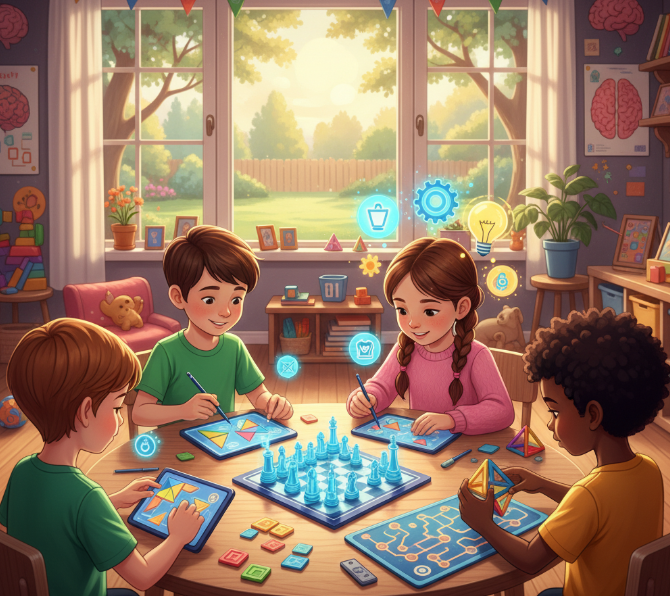
Top Brain-Boosting Games for Kids at Home
14. Obstacle Course with Challenges
Set up a mini indoor or backyard course. At each stop, kids must solve a brain teaser.
Ideas for Challenges:
-
Solve a riddle.
-
Answer a math question.
-
Match flashcards.
Why It’s Effective:
-
Combines mental and physical activity.
-
Builds quick problem-solving.
-
Keeps kids energized and engaged.
15. Freeze Dance with Memory
Play music, let kids dance, then freeze. When the music stops, ask a quick question (e.g., “What is 7 × 6?”).
Benefits:
-
Boosts memory recall.
-
Encourages physical fitness.
-
Combines fun with learning.
Digital Brain-Boosting Games (Balanced Screen Use)
While too much screen time isn’t healthy, carefully chosen apps can support brain growth.
16. Prodigy Math Game
An online role-playing game where solving math problems unlocks new levels.
17. Duolingo Kids
Helps kids learn new languages through fun challenges.
18. Brain Training Apps (like Lumosity Kids or Elevate Jr.)
These focus on memory, logic, and speed exercises.
⚠️ Parent Reminder: Limit screen time to 30–60 minutes daily and balance with offline activities.
Quick Brain Games with Everyday Items
Sometimes the simplest tools create the most powerful games.
-
Cup Stacking: Builds focus and coordination.
-
Guess the Object (Blindfolded): Strengthens sensory perception.
-
Sorting Challenge: Sort buttons, coins, or beads by size/color—improves classification skills.
Fun Brain Game Chart for Parents
| Game | Best for Ages | Skills Boosted | Time Needed |
|---|---|---|---|
| Memory Match | 4–10 | Memory & focus | 15 mins |
| Chess | 6+ | Logic & planning | 30–45 mins |
| Lego Challenge | 5–12 | Creativity & engineering | 20 mins |
| Scrabble Junior | 6–12 | Vocabulary & spelling | 30 mins |
| Math Hopscotch | 5–10 | Math & physical activity | 20 mins |
Tips for Parents to Maximize Benefits
-
Play Together: Kids learn better when parents participate.
-
Keep It Fun: Avoid turning games into exams—keep the mood light.
-
Rotate Games: Change activities weekly to avoid boredom.
-
Balance Indoor and Outdoor: Mix active and calm games.
-
Encourage Reflection: After playing, ask questions like “What strategy worked best?”
Conclusion: Smarter Play, Happier Kids
Brain-boosting games are more than entertainment—they are tools that prepare children for lifelong learning. From puzzles and memory challenges to active math hopscotch and creative Lego builds, every game develops a different skill. Parents don’t need expensive tools; with simple household items and creativity, they can turn everyday play into brainpower.
By making these games part of daily routines, kids will not only stay busy and happy but also grow sharper, more focused, and ready to face new challenges.
👉 Next time your child says, “I’m bored,” hand them a brain-boosting game instead of a screen. Their future self will thank you!
